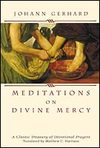
Today, January 29, 2006, is the Fourth Sunday after Epiphany. In the historic Lutheran church year, the Gospel reading for today is from Matthew 8:23-27, Christ stilling the storm. J.S. Bach wrote what perhaps is one of his most operatic cantatas, BWV 81 “Jesus schlaeft, was soll ich hoffen” — “Jesus sleeps, how can I hope?” for this Sunday. It puts the Christian in the boat with Christ, as the storms of life rage. Here then is a meditation on the Gospel reading, inspired by Bach’s Cantata 81.
In this life there are times when all appears lost and no hope seems possible. Death stares us square in the face. We cry out to the Lord, wondering why He seems so far off, so far away. Why does He seem to hide Himself in the midst of our trouble? Why does He sleep when we are threatened so? The storms of life churn around us and crash against us, doubling their rage and anger. Where do we turn when the guilt of our sin fills us with grief, or when loneliness and worry, anguish, fear, frustration, or anger, press down unbearably?
In the midst of life’s storms and tempests, the Christian stands like a boulder, while all around the stormy wind howls and angry waves roar and foam, threatening to weaken our faith. We hear the voice of our Lord and Savior, Jesus Christ, “Oh, you of little faith, why are you so fearful?” He speaks to the storms and winds and waves in our lives, “Be still! Be quiet! Return to the boundary set for you, so that my chosen ones will not be lost. Be still! Be quiet!” He speaks His forgiveness, “Be still! Be quiet!” He speaks to your worries, your fears and your anxious thoughts, “Be still! Be quiet! I have overcome all of this, for you. Sin has met its match. Satan is vanquished. Even death can not destroy you. I have come for you. My death, is your life. In my peace, you find your rest. Therefore, be quiet. Be still.”
How blest you are when Christ speaks His word to you. Your helper awakes and with Him all the storms and troubles and angry raging seas of life, all the dark and fearful nights of sorrow and worry and anguish are gone. How? Beneath the shelter of His healing mercy you find your rest and hope and safety in the storms of life. You are freed from all enemies. So, let the Evil Foe rage and storm. Jesus stands with you. Yes, even while thunder and lightening crash and flash all around, Jesus is here with you. Sin and hell do frighten and threaten, but there is One greater than them, Jesus, your priceless treasure. And he says to you, “Peace! Be still!”


